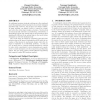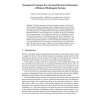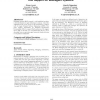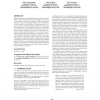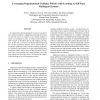121
Voted
SIGECOM
2006
ACM
15 years 8 months ago
2006
ACM
In multiagent systems, strategic settings are often analyzed under the assumption that the players choose their strategies simultaneously. However, this model is not always realis...
132
Voted
ROBOCUP
2007
Springer
15 years 8 months ago
2007
Springer
Abstract. This paper shows how multiagent systems can be modeled by a combination of UML statecharts and hybrid automata. This allows formal system cation on different levels of ab...
127
Voted
EEMMAS
2007
Springer
15 years 8 months ago
2007
Springer
Multiagent systems for mobile and pervasive computing should extensively exploit contextual information both to adapt to user needs and to enable autonomic behavior. This raises th...
126
click to vote
ATAL
2007
Springer
15 years 8 months ago
2007
Springer
Abstract. This paper introduces semantical concepts to support a formal structural dynamics of situated multiagent systems. Multiagent systems are seen from the perspective of the ...
94
Voted
ATAL
2007
Springer
15 years 8 months ago
2007
Springer
Ontology matching is currently a key technology to achieve the semantic alignment of ontological entities used by knowledge-based applications, and therefore to enable their inter...
125
click to vote
ATAL
2007
Springer
15 years 8 months ago
2007
Springer
Multiagent systems (MAS) research is well established yet there is little development of agent technology in industry. It has been suggested that this is due, in part, to the unav...
99
Voted
ATAL
2007
Springer
15 years 8 months ago
2007
Springer
Making commitments, e.g., through promises and threats, enables a player to exploit the strengths of his own strategic position as well as the weaknesses of that of his opponents....
130
Voted
AOSE
2007
Springer
15 years 8 months ago
2007
Springer
This paper describes the Organization-based Multiagent System Engineering (O-MaSE) Process Framework, which helps process engineers define custom multiagent systems development pr...
104
Voted
IAT
2007
IEEE
15 years 9 months ago
2007
IEEE
The agents in multiagent systems can coordinate their actions and handle tasks jointly by forming coalitions. One of the important steps in this process is the fair division of pa...
107
Voted
SASO
2008
IEEE
15 years 9 months ago
2008
IEEE
As organization-based multiagent systems are applied to more complex problems, configuring and tuning the systems can become nearly as complex as the original problem a system wa...
